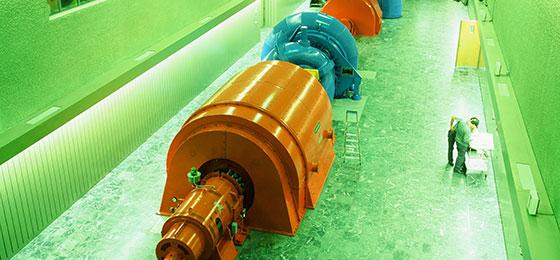The future of Swiss hydropower

Hydropower operators must face new market realities and plan their investments more flexibly.
As part of the National Research Programme “Energy Turnaround” (NRP 70), researchers from Basel, Chur, Geneva, Sierre and Winterthur investigated how to expand hydropower and keep it profitable over the long term in the face of economic and environmental pressure. To do this, hydropower operators must face new market realities and plan their investments more flexibly. In addition, the interests of all parties concerned must be carefully balanced. This applies in particular to the future design of the system of water fees.
In recent years, declining wholesale electricity prices have kept Swiss hydropower constantly in the headlines. Owners publicly considered selling assets and enforced further subsidies. “With an impressive past behind it, Swiss hydropower also has a future, even in a persistently challenging market environment. It can stand on its own – provided it prepares carefully, invests flexibly and is able to balance the demands of different interest groups,” says Prof. Hannes Weigt of the University of Basel, commenting on the research results.
Flexible approach to fluctuating prices and long-term investment decisions
Because Switzerland has little influence over global energy prices and the European emissions trading system, hydropower plant operators will have to continue to adapt to price fluctuations in the future. However, a more flexible system for optimising trading strategies can only be expected to generate additional revenue potential in the range of 10 to 25 percent. Although this is likely to be crucial for cost recovery of electricity prices in the CHF 40 and 60/MWh range, it will not be sufficient if prices remain below this level for longer periods.
The uncertain and increasingly competitive market environment makes flexible investment decisions all the more important. The researchers recommend that investors in hydropower projects should initially build small installations and keep their options open for future expansions, in line with the motto “Think big, start small”.
It’s more than just energy
Hydropower is in an area of tension between investors’ profit targets, federal energy goals, cantonal and local budget requirements, regional development goals as well as national and international regulations. The research team concluded that only a comprehensive sustainability assessment can reconcile conflicting interests to arrive at the so-called social net present value of hydropower projects. This is essential for hydropower to be rated positively and to be accepted even in an uncertain market environment.
Fixed or variable? The water fees question
In a further study, the researchers examined two aspects that are central to reform of the system of water fees that has been deferred to 2024: 1) potential shifts in financial flows from companies to cantons and municipalities in the case of a water fees system with fixed and variable components; and 2) the long-term impact of water fees at the cantonal and regional level and on the upcoming concession renewal.
“Our analysis of net profits under different potential market developments and water fees systems shows that market price developments often dominate the impact of water fees,” says Weigt. “The fee design is mostly relevant for a subset of firms and within a specific electricity market price range of around CHF 40 to 60/MWh, in which the impact of the fee can make a difference between profit and loss as well as investment and no investment.”
This conflict between paying and receiving parties can only be resolved through a participatory process involving all sides. As with the upcoming concession renewal, adjustments to the water fees system are needed to handle market uncertainty and to make hydropower competitive with other energy and storage providers. At the same time, new market components and the impact of full liberalisation must also be considered. “Five years seems like a lot of time to address these points,” says Weigt. “But the experience of recent years shows that a more ambitious approach is needed.”
- Final Project Report “The Future of Swiss Hydropower: Realities, Options and Open Questions” (March 2019)
- Further information
- "Die Schweizer Wasserkraft muss noch flexibler werden"; Interview with Prof. Hannes Weigt
